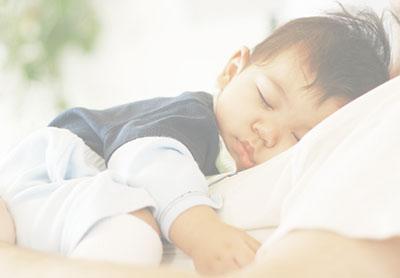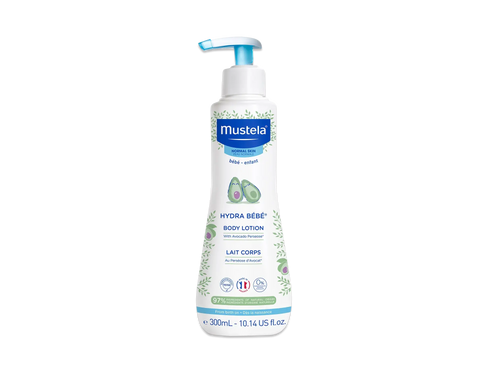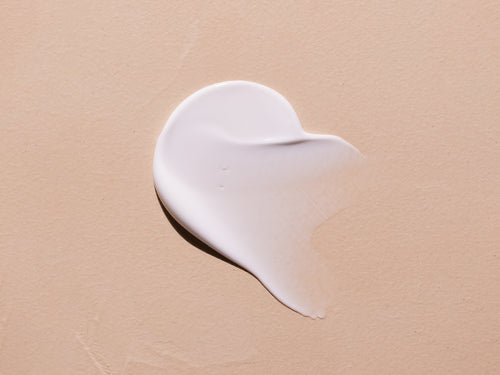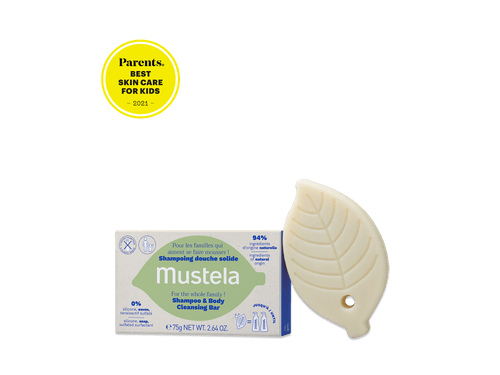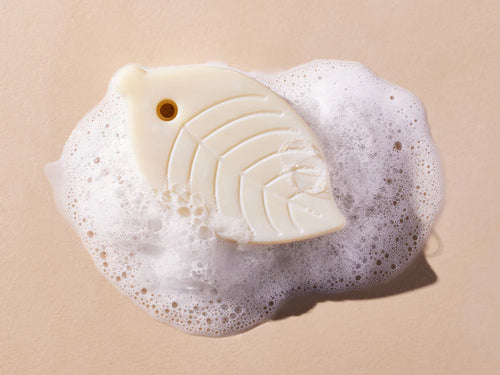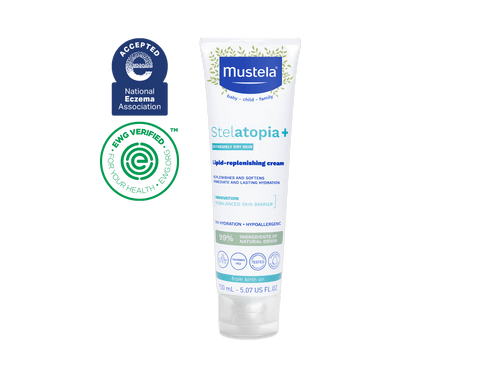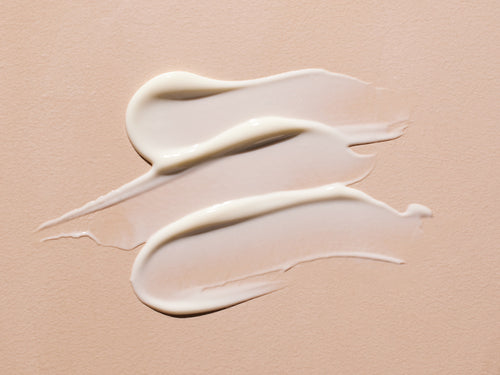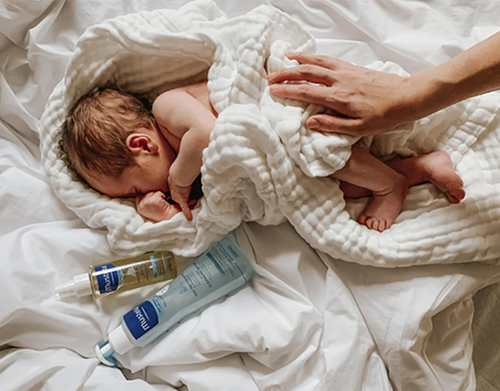Baby safety is at the top of every parent’s to-do list when their little one first comes home from the hospital. For newborns, your safety concerns will center around sleeping, bathing, eating, and traveling in the car.
As your baby grows, the safety issues will expand to include preventing falls, burns, injuries, and illnesses, just to name a few. How is a concerned parent supposed to keep track of it all? The experts at Mustela are here to help.
In this article, we’ll give you 16 tips to keep your baby safe at home and on the go. Along the way, we’ll address concerns such as:
- Baby safety in the bath
- Baby safety in the car
- Baby safety in the sun
- Preventing baby falls
- Baby safety while changing diapers
- Baby safety while eating
- Baby safety while sleeping, and much more
16 Tips To Keep Your Baby Safe
1) Baby Safety In The Bath

The most important rule for bath-time safety is keeping your eye on your little one. You never want to leave them unattended, as they aren’t able to pull themselves upright if they slip inside the bath.
Even if you need to grab something essential to bath time, like shampoo or body wash, never turn your back on your baby. Leaving your child unattended for any amount of time can be dangerous when water is involved.
Always keep one hand on your little one’s side or back if you have to stretch to reach for something. Never let go of them!
You can make it easier (and safer) by keeping bath products within reach of you, but far enough away from your baby’s wandering hands!
You’ll also want to pay close attention to the temperature of your baby’s bath. Aiming for the perfect balance of not-too-hot, not-too-cold is important for maintaining the health of your baby’s delicate skin. You don’t want them to get burned or sick.
Water around 100 degrees Fahrenheit is perfect. If you don’t have a thermometer handy, you can test the water by touching your elbow just beneath the surface. If it feels warm, you’re good to go!
Keep in mind, too, that soapy bodies are slippery! You’ll want to keep a firm, stable hand on your baby for the entirety of their bath time.
2) Learn The Heimlich Maneuver And CPR
The Heimlich Maneuver and CPR are two invaluable skills that every parent should know. The Heimlich Maneuver can dislodge food or other small objects from your baby’s throat while CPR can keep blood and air flowing in the event of a serious accident.
The Heimlich Maneuver and CPR are different for newborns and babies than for children and adults, so be sure to study all the variations. To be extra safe, we recommend posting directions for both skills in a prominent place in case you need them in an emergency.
3) Baby Safety In The Sun
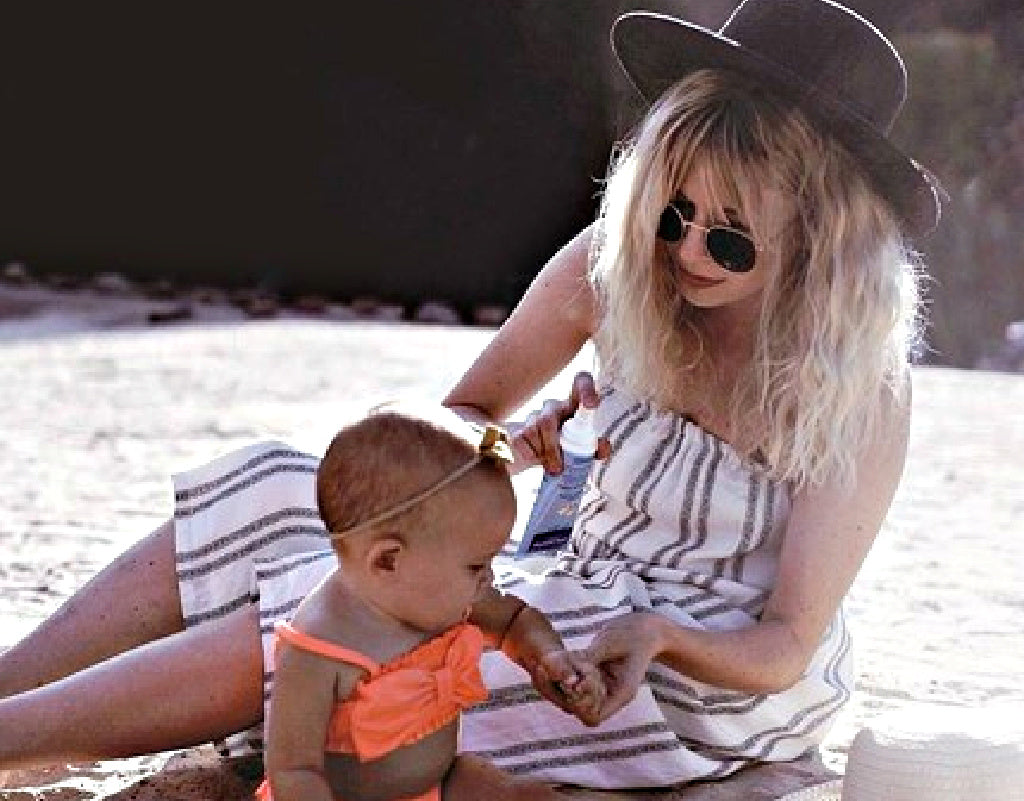
Apply a high SPF sunscreen like Mustela’s SPF 50+ Broad Spectrum Mineral Sunscreen Stick whenever your baby may be in the sun. That includes playing indoors near the windows on a sunny day. Because your little one’s skin is so delicate, it’s always better to be overly cautious when it comes to sun protection.
Remember sunscreen has to be reapplied every two hours! For children under six months, it’s best to avoid leaving your baby in the sun for long periods, anyway. But if there’s a special occasion, be sure to reapply sunscreen!
While it’s important to bring your child into the sunshine and let them soak up the vitamin D, you want to be careful about overexposing them! Opting to hang out with your baby in the shade is the best way to keep them safe.
If there is no shade, it’s always a great option to keep an umbrella or hat handy to block the sun from your baby’s face. If you push them around in a stroller, keeping the hood low is also a good protective measure.
Dressing your little one in lightweight, sun-protective clothing will also keep them safe from UV damage.
4) Baby Proof Your Home
Keep your baby safe at home by baby proofing the areas where your little one spends most of their time. Cover all electrical outlets, lock cabinets and drawers in the kitchen and bathroom, and move books, lamps, and other heavy objects above your baby’s reach.
Be sure to watch out for wobbly furniture that can be pulled over if your baby grabs onto it when trying to stand. Sharp corners are important to watch out for, as well. Use baby bumpers or safety padding to smooth out those pointy corners!
Opt out of any curtains or window blinds with looped cords that your baby’s arms, legs, or neck could get caught up in. You can install safety slips or tassels to keep the cords out of your baby’s way.
Even when you baby proof your entire house, guests that may come visit could have something in their purse or backpack that could hurt your baby. Keep your guests’ belongings away from your little one and off the floor.
Finally, invest in technologies that keep the entire family safe (not just your baby!). Keep up with your smoke detector batteries, get a carbon monoxide detector, keep a fire extinguisher in the utility closet, and keep your first aid kit stocked.
5) Baby Safety In The Car
Always strap your child into a federally-approved car seat and never carry your newborn in your lap, even on very short trips.
From birth to two-years-of-age, the car seat should be placed in the middle of the back seat and should always be facing backward with your baby looking towards the rear of the vehicle.
If your vehicle has no back seat, disable the airbags and place your baby on the passenger side with the car seat facing backward.
Additionally, if you live in an area that has especially strong sun exposure, invest in some stick-on sun blockers for the windows near your baby’s car seat. Avoid any that hang freely from the window or use suction cups. You want them to lay smoothly against the window.
Try and keep the seats, floor, and any door-side compartments clear of choking hazards like coins, pens, small bits of trash, or old crumbs.
6) Protecting Your Baby’s Skin
Because your newborn’s skin is extra sensitive and delicate, it can easily become dry and cracked. That’s why it’s important to protect your baby’s skin at all times with baby-safe moisturizing products like Mustela’s Hydra Bebe Body Lotion and Hydra Bebe Facial Cream.
Mustela products are composed of natural ingredients, certified hypoallergenic, and free of parabens, phthalates, and phenoxyethanol. They’re the perfect option for maintaining your little one’s fragile, sensitive skin and keeping it smooth and healthy!
7) Preventing Baby Falls

Fall hazards are everywhere, especially when in a house with stairs. Protect your baby by blocking all stairs at all times with a baby gate.
Never leave your baby unattended on furniture, like the couch or the bed. If you set your baby in an infant seat, be sure the seat is on the floor and that your baby is strapped in. The same precautions apply for baby gear like swings, jumpers, or other fun contraptions.
Always double-check that your little one is properly strapped in and that their toy is properly built and maintained!
Finally, keep in mind that a baby crawling or walking with a pacifier, food, or bottle in their mouth is at increased risk for injury if they fall. The object in their mouth could injure their face or mouth.
Having your little one sit or lie down when they have something in their mouth can minimize the risk of injury.
8) Do Not Smoke Around Your Baby
Never smoke inside the house where the toxic chemicals found in second-hand cigarette smoke could be inhaled by your baby. Even when you smoke outside, the chemicals can stick to your clothes and affect your baby’s health.
If there are loved ones in your life who smoke, explaining your household rules that are used to keep your baby safe can help them understand what to do before they come to visit your little one.
Ensuring they never smoke around the child; wash their hands before touching the child; and removing any jackets, gloves, or external clothes they wore while smoking can help minimize your baby’s exposure to cigarette smoke and its toxins.
The best thing you can do for your baby’s safety is to quit smoking right away. If there are other smokers in your family, quitting together could help form a support system for you all as you move toward a healthier lifestyle for you and your little one.
9) Baby Crawling & Walking Safety
Your baby could begin to crawl as early as 6-months old. Three months later, your little one could take those first tentative steps towards walking. By 14 or 15 months, they’ll be walking most of the time so it’s important to think about safety wherever they go.
Be sure you cover all electrical outlets and secure electrical cords to the baseboard as much as possible. Install child safety locks on all drawers and cabinets in the kitchen and bathroom, and anchor bookcases and wobbly furniture so they don’t fall over and injure your child.
10) Inspect Your Baby’s Toys
You should periodically inspect your baby’s toys to make sure there are no loose pieces that could break off and wind up in your little one’s mouth. It’s also a good idea to clean your baby’s toys every few weeks to keep dust and dirt from accumulating on their surfaces.
A good rule of thumb is to opt for toys that are large — larger than your child’s mouth, especially! This will ensure your child won’t choke on it when they play (and probably slobber all over it).
Avoid objects that include projectiles. These toys can easily end up inside your baby’s eyes or mouth, as they often include smaller pieces since those are the easiest things to make “fly.”
Lastly, excessively loud toys can damage your child’s hearing. Baby toys that expose your little one to music and creativity are great! Just make sure they’re safe for young children’s developing ears.
11) Carry Your Baby Correctly
When you carry your baby the right way, it ensures that their little body is always protected. Most of the time, you will likely carry your baby nestled in the crook of your arm. To carry your baby properly, place your forearm under your baby’s back and be sure to support their tiny head.
At other times, and for older babies, you can carry them upright against your chest. Place one hand under your baby’s rear end (as if your baby is sitting on your forearm), and the other hand on their back to keep them pressed against you.
12) Wash Your Baby’s Hands Often
To keep your baby happy and healthy, and to avoid colds and the flu, wash your baby’s hands often. Babies touch everything, especially after they learn to crawl. Those hands usually wind up in your baby’s mouth at some point, so bacteria and viruses pose a very real threat.

When you’re washing your little one’s hands, remember to follow these guidelines for the cleanest hands:
- Wash for 20 seconds (singing the “Happy Birthday” song twice will get you to the right amount of time!)
- Clean all over, including underneath your baby’s fingernails
- Make handwashing fun for your little one by singing silly songs, using kid-friendly soap, and even making a game out of it
A quick and easy way to keep your baby’s hands clean when you can’t access soap and water is to use Mustela’s Cleansing Wipes. Scrub your little one’s hands well with our wipes, and then wash them thoroughly once you’re able to.
13) Baby Safety While Changing Diapers
To ensure your baby’s safety while changing their diaper, always keep one hand on your little one’s torso. If you use a changing table, be sure to strap your child down to prevent an accident.
It’s also important that you keep all your changing supplies like a Diaper Rash Cream, Liniment, and No Rinse Cleansing Water within easy reach. That way you never have to turn your attention away from your precious child.
14) Baby Safety While Eating

When you’re breastfeeding or bottle feeding your baby, keeping them safe is easy. But when they begin to eat on their own, the safety issues increase. If you put your baby in a highchair, make sure it is stable and will not topple over when your baby kicks and wiggles.
In addition, skip the raw carrot chunks, apple slices, nuts, and other hard foods that could cause your baby to choke.
15) Baby Safety While Sleeping
To keep your baby safe while they sleep, always make sure your little one is put down on their back, never on their stomach. Similarly, remove all soft bedding like pillows, extra blankets, and large plush toys from your child’s crib as these items can potentially block your baby’s mouth and nose during the middle of the night.
Experts recommend that, for at least the first year of their life, your baby should sleep in the same room as you but never in your bed. Babies need a firm, clear space to sleep where they can stretch and wiggle without possibly getting trapped in loose materials.
Dressing your little one in lightweight, comfortable clothes can also help them sleep more soundly and reduce the risk of overheating during the night.
For comfy, safe sleep that’s also skin-friendly, dress your baby in our Stelatopia Skin Soothing Pajamas. Designed for babies and toddlers with eczema-prone skin, these 100% cotton pajamas deliver skin-soothing moisture throughout the night!
16) Preventing Burns
If you bottle feed your baby, avoid microwaving the formula. Instead, submerge the bottle in warm water, and be sure to shake often. Before you feed the formula to your child, test the temperature on your wrist.
When your baby starts to crawl, stand, and walk, turn all pot and pan handles toward the wall when your stove is on so your little one doesn’t accidentally pull something down.
Expert tip: always keep a tube of our Cicastela Moisture Recovery Cream in your diaper bag. This safe and effective multi-purpose ointment delivers soothing relief from head-to-toe and is a first aid kit essential!
You Can Never Be Too Careful When It Comes To Your Baby’s Safety
You can never be too careful when it comes to your baby’s safety. By following the 16 tips above, you’ll be in a great position to keep your little one safe whether they’re sleeping, splashing in the bath, or taking a car trip to grandma’s.


